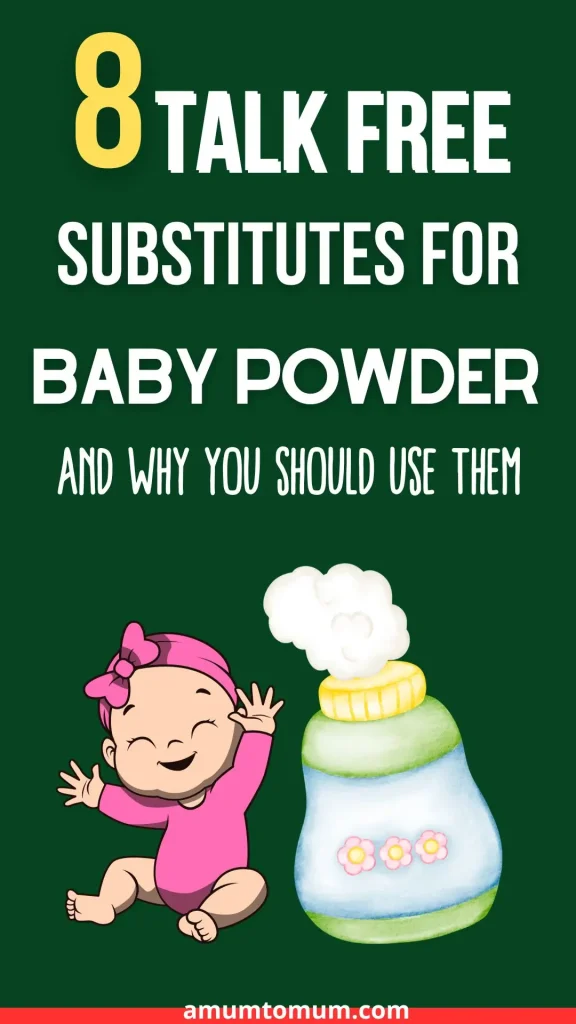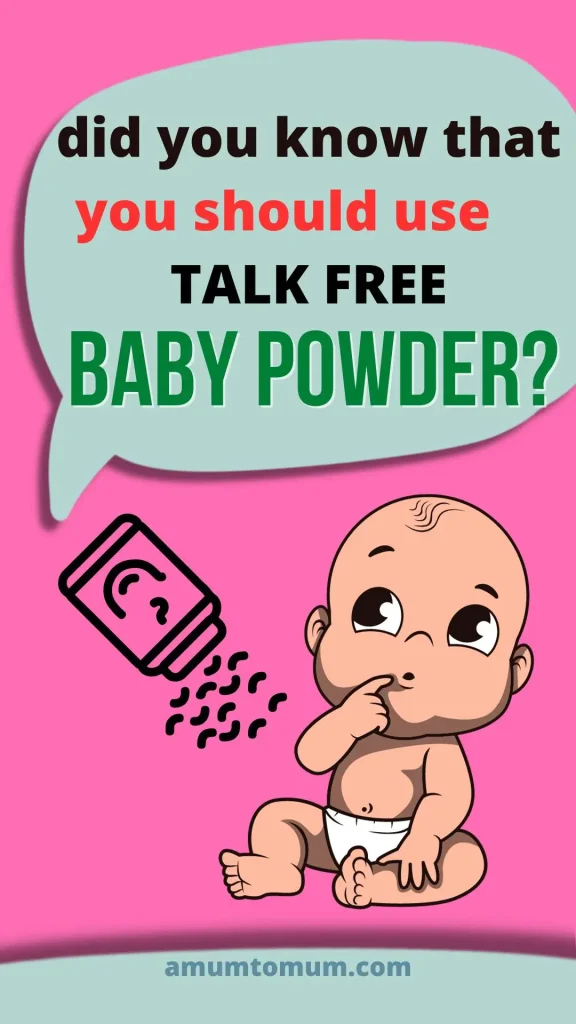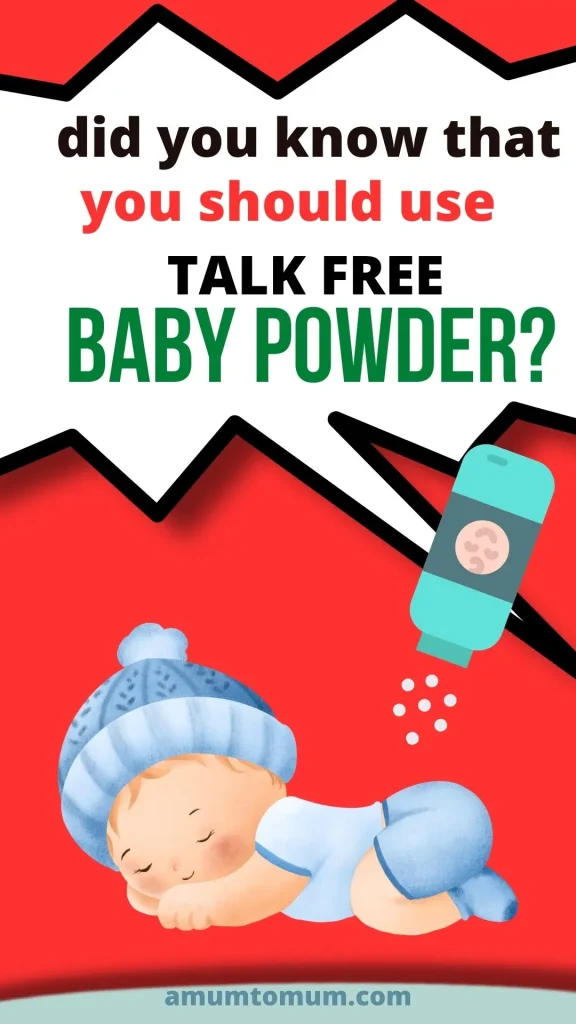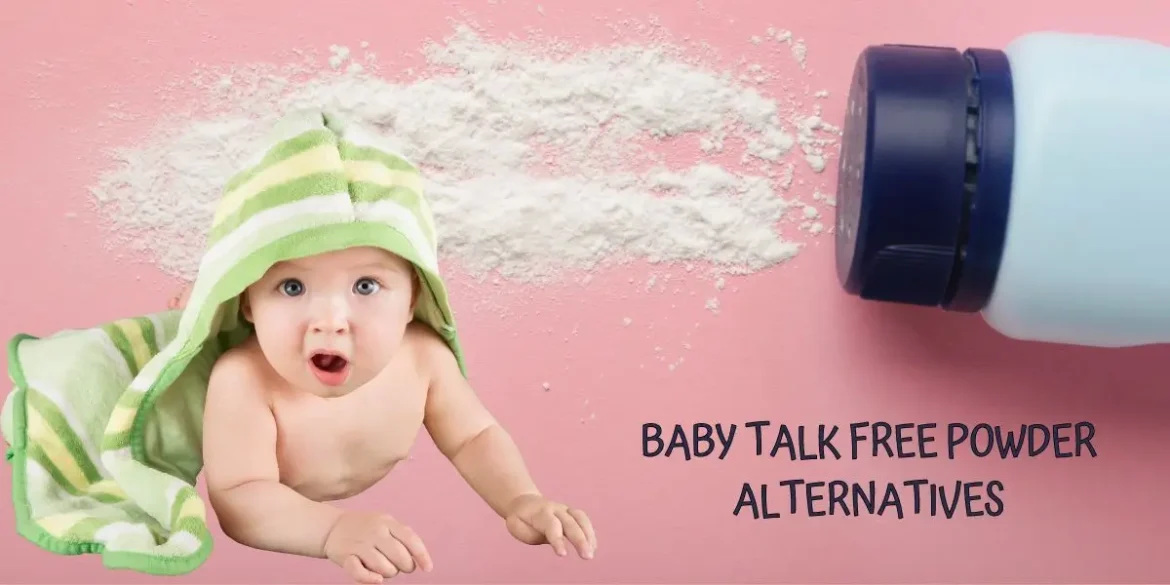As we dive into the topic of substitutes for baby powder, we’re here to assure you that there are safe and effective alternatives available. Talc free ones!
Our goal is to help keep your baby’s skin dry and free from irritation. We’re saying goodbye to potential risks and welcoming natural options that work just as well.
Cornstarch, arrowroot, rice starch, and baking soda are some of the alternatives we’ll be discussing. These substitutes are known for their ability to prevent diaper rash. However, it’s important to note that we should avoid powder inhalation to prevent any risk of lung damage.
Switching to creams is another option we recommend. The benefit of creams is that they eliminate the risk of lung damage.
Let’s work together to ensure your baby’s well-being.
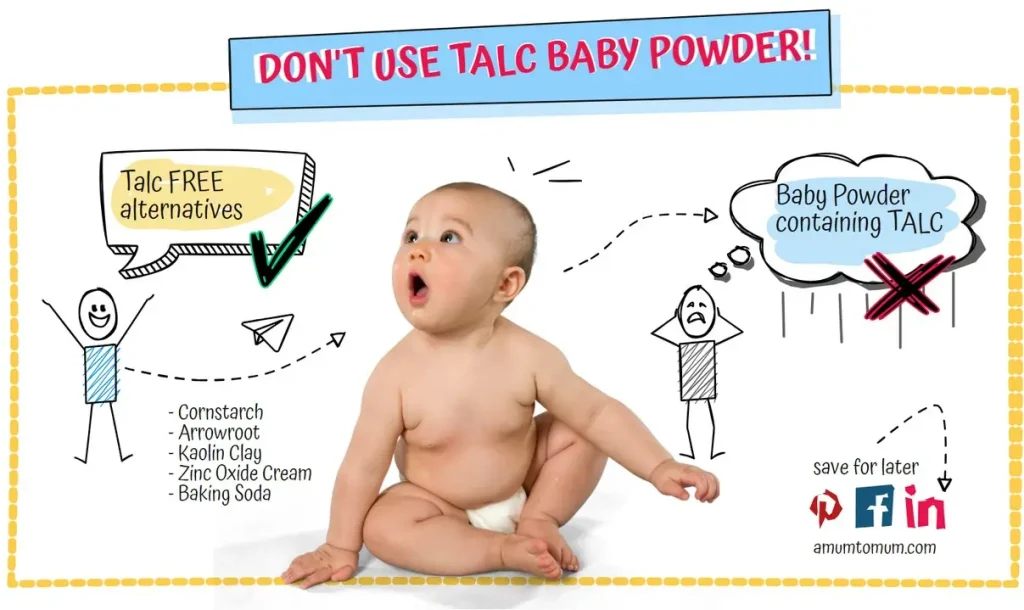
Understanding Baby Powder Risks
In our quest to comprehend the dangers of baby powder, we delve into the risks associated with talcum powder. There’s a concerning link between talcum powder and ovarian cancer.
When talking about whether talcum powder is linked to cancer, it is important to distinguish between talc that contains asbestos and talc that is asbestos-free. Talc that has asbestos is generally accepted as being able to cause cancer if it is inhaled. The evidence about asbestos-free talc is less clear.
American Cancer Society
What’s more concerning is that talcum powder might contain asbestos, a substance that can cause a type of cancer called mesothelioma if breathed in. The U.S. FDA, unfortunately, can’t assure us that products containing talc are free from asbestos.
Under the Federal Food, Drug and Cosmetic Act (FD&C Act), cosmetic products and ingredients, with the exception of color additives, do not have to undergo FDA review or approval before they go on the market.
FDA, US Food and Drug
To sidestep these risks, we suggest using baby powders that don’t contain talc. Safe alternatives like baking soda, arrowroot, and tapioca starch can keep a baby’s skin dry without the potential dangers of talcum powder.
We recommend being careful with Johnson’s baby powder, a well-known brand, due to its talc content.
#1 The Cornstarch Substitute for Baby Powder
The use of cornstarch as an alternative to baby powder for babies has gained popularity in recent years. Cornstarch, a finely milled powder derived from corn, offers a natural and safe option for parents looking to avoid talc-based products.
Many parents have found that cornstarch helps absorb moisture and soothe their baby’s delicate skin, reducing the risk of irritation and diaper rash. Additionally, cornstarch is hypoallergenic and free from potentially harmful chemicals, making it a suitable choice for babies with sensitive skin.
in grocery stores, drugstores, and online. Generally, they’re safe to use and can help keep our baby’s skin dry and rash-free, bypassing the potential hazards associated with talcum powder.
**Disclosure: This page contains affiliate links. If you choose to purchase after clicking a link, I may receive a commission at no extra cost to you.
#2 Arrowroot as Baby Powder Substitute
Substituting baby powder with arrowroot powder is an excellent choice, especially for those who are allergic to corn. We can find this powder in various locations, such as grocery stores, natural or health food stores, and even online.
Certain commercial brands like Oras Amazing Herbal Baby Powder and Bee All Natural Organic Baby Powder blend arrowroot starch into their products. One of the key benefits of arrowroot is its ability to absorb moisture effectively, making it a perfect substitute for baby powder.
#3 Tapioca Starch Use
You can also use tapioca starch as an alternative to talcum powder. This humble ingredient, extracted from the cassava plant, can be easily located in grocery stores, online platforms like Amazon, and specialty food outlets. It’s an affordable and adaptable choice for those of us searching for talc-free options.
Let’s look at five methods to incorporate tapioca starch into our baby powder routine:
- We can make homemade baby powder by combining tapioca starch with baking soda and a blend of cornstarch.
- We can opt for well-known brands that utilize tapioca starch in their composition, such as Nature’s Baby Dusting Powder and Peas in a Pod Sweet Cheeks Baby Bum Powder.
- Tapioca starch can be used alone as a powder for soaking up moisture and maintaining dryness on your baby’s skin.
- We can mix tapioca starch with other natural constituents like arrowroot or kaolin clay to create a tailored baby powder mixture.
- We might consider pairing petroleum jelly or oatmeal baths with tapioca starch for comforting and safeguarding your baby’s delicate skin.
#4 Kaolin Clay
The use of kaolin clay as an alternative to baby powder in caring for infants has gained attention recently. Kaolin clay, a natural mineral rich in silicate, offers numerous benefits for babies’ delicate skin.
It has soothing properties that help alleviate diaper rash and irritation, while also absorbing excess moisture. This gentle and hypoallergenic alternative is particularly beneficial for babies with sensitive skin or those prone to allergies.
#5 Benefits of Baking Soda
Sodium bicarbonate, also known as baking soda is another great substitute for baby powder for your infant. We suggest incorporating it into the daily care routine for babies. Baking soda, a safe alternative to talcum powder, is a healthier choice as talcum powder poses potential health risks, such as ovarian cancer.
This common household item is not only easily accessible in most stores but also offers odor-absorbing properties, helping to keep the baby’s skin dry and fresh.
- For those looking for a more gentle option, baking soda can be mixed with cornstarch or kaolin clay to make a blend suitable for sensitive skin. Some store-bought blends already include baking soda, enhancing their versatility and affordability.
Let’s look at a simple table showcasing why baking soda is a good substitute for baby powder:
| Benefits of Baking Soda |
|---|
| Safe alternative to talcum powder |
| Odor-absorbing properties |
| Keeps baby’s skin dry |
| Convenient and affordable |
| Can be combined with other ingredients for sensitive skin |
#6 Zinc Oxide Cream: A Safe Substitute
We want to talk about zinc oxide cream, a safe substitute for baby powder. We believe five simple reasons make zinc oxide cream a better choice.
- It’s gentle and safe for a baby’s sensitive skin.
- It forms a protective barrier on the skin, which helps in preventing moisture and diaper rash.
- It’s great at absorbing moisture, which keeps your baby’s skin dry and comfortable.
- It’s easily obtainable as you can find it in most drugstores and online retailers.
- Many pediatricians and researchers recommend zinc oxide cream over talcum powder for baby care.
Topical zinc oxide cream was better than talcum powder for the prevention of irritant contact diaper dermatitis.
Research Gate
#7 Rice Starch
The use of rice starch as an alternative to baby powder for babies is a growing trend. Rice starch, derived from rice grains, offers a natural and safe option for parents concerned about the potential risks associated with traditional baby powders.
With its hypoallergenic properties, rice starch helps to absorb moisture and keep the baby’s skin dry, preventing diaper rash. Furthermore, the abundance of essential nutrients in rice starch promotes healthy skin development in infants.
The switch to rice starch as a baby powder alternative not only ensures the comfort and well-being of babies but also reflects a conscious effort toward using organic and sustainable products.
#8 Or Just Don’t Use Anything
Using baby powder is not necessary for your child’s care. I personally did not use it on my two daughters and they never experienced any diaper rash issues.
Instead, I ensured that their skin was always dry and clean before putting on their diapers.
However, if your child has sensitive skin, I hope that the alternative options mentioned, which are safer than traditional talc-based baby powders, will be suitable for your specific needs.
Frequently Asked Questions
What Is an Alternative to Baby Powder?
In our search for an alternative to baby powder, we’ve found that cornstarch, arrowroot, or rice starch are effective options. These natural substances help us to maintain our baby’s skin dryness and prevent diaper rash without exposing them to the potential risks associated with talcum powder.
What Replaced Johnson Baby Powder?
In our search for what replaced Johnson Baby Powder, we found several safe and effective alternatives. We can rely on products such as cornstarch, arrowroot, and rice starch. Baking soda, tapioca starch, and kaolin clay also serve the same purpose. Additionally, zinc oxide cream and oat flour blends make excellent substitutes. All these alternatives, while keeping the baby’s skin dry, also prevent diaper rash without introducing the risks associated with talcum powder.
Can I Use Plain Cornstarch Instead of Baby Powder?
We can indeed utilize plain cornstarch as an alternative to baby powder. It’s known and accessible widely for its ability to keep our baby’s skin dry and avert diaper rash.
What Powder Is Safe for Feminine Hygiene?
In our exploration of safe powders for feminine hygiene, we’ve identified several alternatives to baby powder. These include the likes of cornstarch, arrowroot, a blend of baking soda and cornstarch, tapioca starch, and kaolin clay. We found that these options can effectively absorb moisture and reduce the risk of irritation.
Conclusion
Hope you found these substitutes for baby powder useful and enlightening. Keep your babies, kids, and your entire family safe and enjoy those newborn special moments while they last!
More for you to read:
Want to save this article for later?
Pin it!
